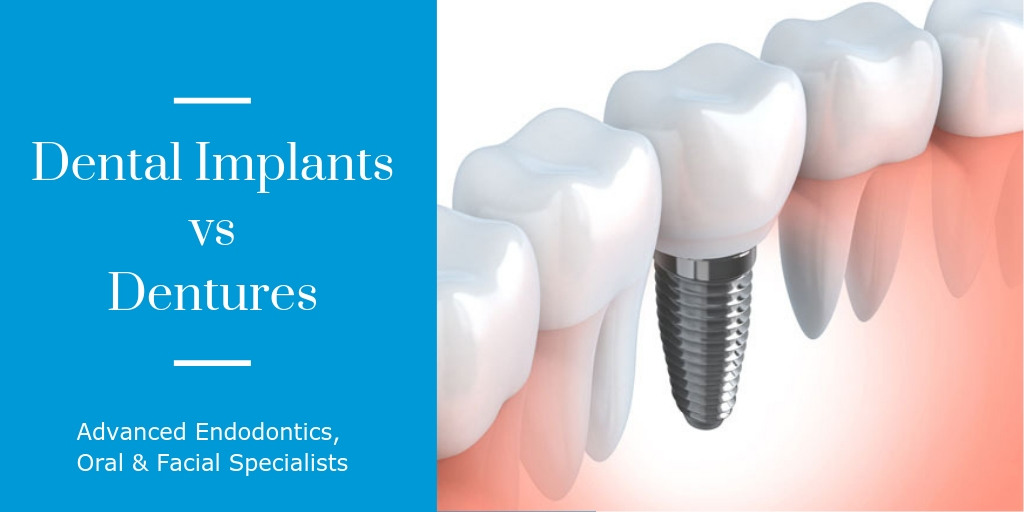 For decades, dentures were the only options available for replacing missing teeth. Once dentures are used, the jawbone begins to deteriorate because it is no longer receiving stimulation; however, dental implants stimulate the jawbone, which keeps it strong. Implants are quickly becoming the tooth replacement of choice for individuals who have missing or deteriorating teeth. So, the question is; what are the differences between dental implants and dentures?
For decades, dentures were the only options available for replacing missing teeth. Once dentures are used, the jawbone begins to deteriorate because it is no longer receiving stimulation; however, dental implants stimulate the jawbone, which keeps it strong. Implants are quickly becoming the tooth replacement of choice for individuals who have missing or deteriorating teeth. So, the question is; what are the differences between dental implants and dentures?
Dentures vs Dental Implants
Dentures, Partials, and Flippers
Full, removable dentures are used when the natural teeth of an entire arch need to be replaced (upper or lower). A partial denture is used to replace missing teeth when some of the patient’s natural teeth still remain. A flipper replaces a single missing tooth or several missing teeth.
These prostheses are usually made of strong plastic; however, there are more expensive versions that have replacement teeth consisting of porcelain. For the sake of comfort, the replacement teeth are attached to a support piece that rests atop the gum. These prostheses are removed for cleaning, and many patients take them out prior to going to bed.
Pros:
- More affordable replacement for natural teeth than other options
- Preserves the facial structure, which improves the patient’s appearance
- Can replace all or just a few of a patient’s missing teeth
- May prevent jaw misalignment
- Can improve a patient’s speech
Cons:
- Since the gum ridges shrink and recede, dentures will eventually become loose; therefore, they will need to be rebased, relined or replaced (typically every four years)
- Adhesives may be needed to ensure the prosthesis stays in place
- Can be uncomfortable and may cause sores to develop
- Eating certain foods is difficult (e.g., corn on the cob, caramels, apples, etc.)
- Does not permanently remain in the mouth
While the initial monetary cost of these prostheses is nominal, this is not the ‘full’ cost when you consider the costs that will accumulate throughout your lifetime. Your jawbone will resorb because removable prostheses will not stimulate it the way dental implants do. The cost of the glue to keep them in place must be considered as well as those associated with replacing, repairing and relining these types of prostheses.
Bridges (i.e., Fixed Partial Dentures)
Bridges are artificial teeth that are attached to the patient’s natural teeth to replace the tooth (or teeth) that are missing in between the ‘anchor teeth.’ This type of prosthesis consists of porcelain and complements the shape, size and color of the patient’s natural teeth.
Pros
- Can last up to a decade
- Offers more stability than dentures do
- Improves an individual’s smile
- Prevents jaw disorders
- Preserves facial structure
- Prevents gum and tooth decay
- Each bridge is custom-made to ensure it fits securely and comfortably
Cons
- Can place pressure on the surrounding teeth
- Additional natural teeth might need to be altered or pulled to make room for the prosthesis
- Can only replace a few teeth
Dental Implants
Dental implants are inserted into the jawbone and then osseointegration must take place before the procedure can continue. Osseointegration refers to the fusion between the jawbone and the implant. This fusion is what makes the implant so similar to the natural tooth. The osseointegration process can take from 4 to 6 months. Once this process is complete, an abutment (support post) is connected to the implant and a crown (prosthetic tooth) is placed on top of the abutment.
Pros:
- More stable than bridges or dentures
- Preserves the patient’s facial structure
- Prevents jaw shifting and bone deterioration
- Looks and feels just like natural teeth
- Will not interfere with eating, smiling or talking
- If only one or a few natural teeth are being replaced, the remaining natural teeth are left unharmed
- When cared for properly, implants can last a lifetime
- Easy to care for — brush and floss, biannual cleanings
Cons:
- Usually more expensive than other dental prostheses
- Not suitable for every patient
- Requires surgery
- A sufficient amount of strong bone in the jaw is necessary to place the implants; therefore, if the patient does not have enough and the bone is too soft, a bone graft will need to be performed. Once the bone graft has created enough strong, new bone, (usually takes 2 to 3 months) the dental implant procedure can resume.
- The dental implant procedure can take longer to complete than the procedure to create a set of dentures.
Dental implants have the potential to last a lifetime. They look and feel natural, and allow you to eat whatever you want. These benefits make it is easy to see why dental implants are quickly becoming the preferred tooth replacement solution.
If your teeth are failing and you need them extracted, or you are already missing teeth, please contact Advanced Endodontics, Oral and Facial Specialists today at 803-226-9472 to schedule an appointment. We can help create your new smile.
At Advanced Endodontics, Oral and Facial Specialists, Dr. Jennibeth Robles-Velez performs a variety of procedures at her Aiken, South Carolina office. Each procedure Dr. Robles-Velez performs is designed to ensure her patients enjoy optimal oral and dental health.

